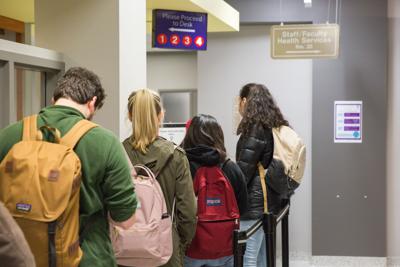
Students wait in line at Health Services in the UCC, Oct. 28, 2018.
In a world of mounting social isolation and constant media consumption, people are face-to-face with their bodies more now than ever before.
As a result, research finds eating disorder symptoms heightened during the coronavirus pandemic.
Jaclyn Siegel, a PhD student at Western University and lecturer at King’s University College, is among two groups of researchers currently focusing on the issue.
“Right when the pandemic began, there was a lot of chaos and confusion, and people did not know where to go [or] who they could trust for reliable and empirically supported information about mental health regarding the pandemic,” says Siegel.
Siegel and colleagues who specialize in eating disorders established Psychologists Against COVID-19, a research group to study and inform about the impact the pandemic has had on people who suffer from them. They noticed many patients were experiencing greater symptoms now compared to pre-pandemic times.
The group’s article compiles research from the SARS pandemic and anecdotal research from people currently living through COVID-19, as opposed to empirical data gathering, due to the time sensitivity of the issue.
“[We found from past research on major disasters that] viewing traumatic news can trigger many forms of psychological distress, including disordered eating behaviours,” Siegel notes.
While this research is not novel, its reimagination in the context of COVID-19 is intended to guide clinicians and people living with eating disorders through the pandemic.
Siegel is also involved in research at the University of Missouri’s Center for Body Image Research and Policy; her research there focuses on specific risk factors for negative body image and disordered eating during the pandemic.
“We found that, in a sample of almost 900 young adults in the United States, 40 per cent of women and 46 per cent of men said that it would be worse to gain 25 pounds during social distancing than to contract COVID-19,” explains Siegel.
Eating disorders impact nearly one million Canadians, many of them young people. With mounting pressure to lose the “Quarantine 15,” it’s no surprise that eating disorders are becoming worse through the pandemic.
Second-year education student, Sarah Jones, echoes the same sentiments.
“So I would say being in a total lockdown and not having friends checking in on you or having those positive social experiences — I think it can definitely exacerbate disordered eating,” she says.
Siegel also mentions that, while eating disorders impact people of all backgrounds, the issue is magnified for marginalized communities, considering the added stress caused by current events.
“We also know that this pandemic is coinciding with the Black Lives Matter movement. And so, particularly for Black students and for Black people, this may be a time of acute stress,” she says. “The effects of this pandemic are also going to be magnified for people with low socioeconomic status, because access to all of the things that are necessary for proper eating disorder, maintenance and recovery.”
Jones says lacking access to support systems is an ongoing issue for students facing issues with body image and disordered eating.
“I'm sure that the university has put forward some efforts and I know at the Faculty of Education are helping with mental health check-ins and that sort of thing which I think is positive, but for me personally, I also rely on my own support system, my friends and my family and my partner is kind of my go to," says Jones.
In spite of the heightened stress caused by the pandemic, Siegel, who has personally lived through an eating disorder, also says there are supports available.
“Eating disorders can be chronic conditions, and people do often experience periods of relapse and remission throughout the course of their lives. But when you reach a place where you are able to see the light that is recovery, it can be such a beautiful, warm hug,” she says.
Apps like Recovery Record, which acts as a replacement for calorie tracking apps that are growing in popularity, are an excellent resource for people struggling with eating disorders. Telehealth and virtual therapy are also increasingly accessible in the pandemic.
Smaller actions, like reducing harmful media like “Fitspo” Instagram posts or harmful news may also reduce anxiety and assist in the recovery process, according to Siegel. She also suggests engaging with people and activities that reduce stress.
Citing her experience working with elementary school kids, Jones noticed that her students are spending more time on social media and comparing themselves to others, which has carried over into students in post-secondary education as well.
“I mean, for myself, I noticed I'm on my phone a lot more now than ever with lots of extra free time and I know that kids are the same way. So I think it affects us too, with social relationships and also just spending more time on our phones and social media so I think it does carry over,” Jones notes.
While social media is a necessary evil in many people’s lives in an unprecedented age of digital citizenship, Siegel mentions self-compassion is an excellent way to combat the flood of harmful media.
“It's such an intensely challenging situation for so many of us. Don't worry about your weight — your weight will figure itself out …” says Siegel. "Finding opportunities to increase your self-compassion could potentially reduce the harmful impact of all of these body image threats that are somewhat inevitable in the age of social media.”







(0) comments
Welcome to the discussion.
Log In
Post a comment as Guest